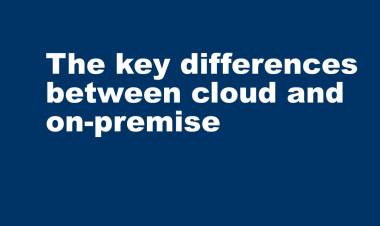2020's Cloud Computing obstacles.

2020's Cloud Computing obstacles.
The following obstacles to Cloud Computing have been identified:
Here are some of the obstacles identified that make it difficult to adopt Cloud Computing:
- Security perception One of the biggest concerns in moving towards Cloud Computing is the security issue. There is still a lot of ignorance about the great security advantages of world-class computing clouds, which mostly outperform that of in-house data centers. However, the perception that the data is safer within their own facilities is still widespread. With the aim of overcoming this obstacle, Stratecast recommends following the guidelines of best security practices such as protecting data (24/7), securing and certifying all software, always encrypting subscriber data and validating security practices, among others. ; activities that meet the cloud computing mostly.
- Perception about compliance with regulation Under the Cloud Computing model, user data can be anywhere in the world. This commits the user to know and comply with existing rules and laws on issues such as storage and dissemination of data, taxes on commercial transactions, among others; regulated in each nation. Similarly, it commits the Cloud Computing provider to take responsibility for compliance with regulations, which leads to audit processes and periodic monitoring. These rules can be easily met by Cloud Computing providers and with greater difficulty on the part of companies; However, there is a perception that in order to comply with regulations, a company must not outsource its information systems.
- Internet Restrictions: Internet traffic is subject to delays introduced by each of the nodes through which it passes. Internet traffic may experience bottlenecks.
- Loss of control In Cloud Computing, the user must anticipate a loss of control over the information, as they do not have access to the servers or cannot be sure that the cloud provider has an adequate continuity plan for the business before any disturbance or physical interruption or failure and closure of the Cloud Computing provider. In fact, Cloud Computing does not allow users to physically own the storage devices of their information or data, leaving responsibility for their storage and control in the hands of a specific service provider. For this reason, there are detractors on the subject who argue that it is only possible use the applications and services that the provider is willing to offer, and that this scheme limits users' freedom by making them dependent on the service provider (Weber, 2008). Although detailed Service Level Agreements may be required, loss of user control remains present.
One of the biggest detractors, Richard Stallman, founder of the Free Software Foundation, also known for establishing a moral, political and legal framework for the free software movement as well as for inventing the concept of copyleft, a method to license software for such so that its use and modification always remain free and remain in the community; states that Cloud Computing endangers the freedoms of users, because they leave their privacy and personal data in the hands of third parties. It also states that this scheme obliges users to acquire services that are of limited use and that will increase their cost over time (Stallman).
Another problem that arises about the concept of external storage of information focuses on aspects related to security, since when dealing with aspects of Cloud Computing related to data hosting (hosting), its regulation and applied legislation depends of the country where the servers that support the service are located, as well as aspects related to integrity, availability or disaster recovery.



















